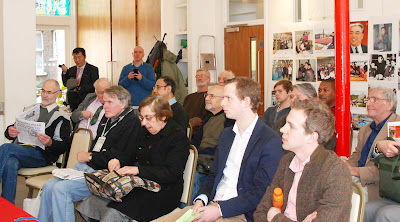 |
| Dr Goodacre pays tribute to Kim Il Sung |
By
New Worker correspondent
FRIENDS and supporters of Democratic
Korea met last weekend near Kings Cross in central London to mark the birthday
of revolutionary leader and theorist Kim Il Sung and hold a wide-ranging
discussion on the crisis sparked by the ongoing US exercises and the
controversial Korea Undercover BBC
Panorama documentary.
The event was
organised by the Juché Idea Study Group of England and the Association For the
Study of Songun Politics UK, and attended by supporters of the Korean
revolution, members of the New Communist Party, progressive academics and
members of the general public.
Dermot Hudson,
chair of the JISG, and Shaun Pickford spoke about the American “Foal Eagle” and
“Key Resolve” nuclear war games which, they said, had the clearly stated aim of
“regime change” in the DPRK, and included “counter-insurgency” exercises with
US and south Korean troops rehearsing
the rounding up of civilians and Workers’ Party members.
Shaun said south
Korea was a US puppet state, and recalled that Park Chung Hee, father of the
current president Park Geun Hye, took power in a military coup and introduced
the fascistic “Yushin” (“renewal”) ideology under which the electoral system
was rigged.
He added that
the DPR Korea has never intervened in any foreign country, but since the Second
World War the United States has intervened in 195 states. In practice, he said,
“any retreat or concessions by the DPRK would lead to subjugation and
self-destruction”.
Dermot reminded
the meeting that it was one year since the election of dear respected Marshal
Kim Jong Un as First Secretary of the Workers’ Party of Korea, showing the
support, trust, respect and affection of the masses of the Korean people and
members of the Workers’ Party.
On the issue of
the DPRK’s nuclear weapons, he said they were “not a bargaining chip for economic
gains, but a national treasure which cannot be sold for millions of dollars”.
He pointed out that there is no
international border with the South Korea, only a military demarcation line,
which the DPRK does not recognise. He also said many defectors from the DPRK
were actually returning, complaining of poor treatment and long working hours
in low paid jobs in south Korea.
James Taylor
spoke on the life and revolutionary activities of Kim Il Sung, saying: “All
true revolutionaries who have encountered his works and heard of his deeds can
only feel themselves inspired and heartened by his example and leadership, by
his contributions to applying Marxism-Leninism to Korean conditions and his
evolution of the Juché Idea.”
Dr Hugh Goodacre
of the University of London recalled meeting with comrade Kim Il Sung in 1990,
and quoted from a new booklet by Kim Jong Un: "When meeting workers, he
held their grease-stained hands without reserve and in a rural village, had
friendly talks with the peasants at the edge of a field; his speeches were
often mixed with jokes, humorous and down to earth. Even though he was held in
high respect and admiration by our people and progressive peoples of the world,
he disallowed any special favour or privilege for himself, and always led a
simple and frugal life with his people."
Dr Goodacre said
that Kim Il Sung’s greatest feat was to author the Juché Idea, based on the
aspirations and ideas of the people, which became the basis of a theory and
ideology able to enlist the inexhaustible strength and creative wisdom of the
masses for national liberation.
Theo Russell of
the New Communist Party brought greetings from the NCP, recalled his visit to
the DPRK in April 2012, and spoke about the “shameful episode” of the hijacking
of a London School of Economics study tour to infiltrate hostile BBC
journalists into the DPRK.
Dermot Hudson
added that many people who watched the Panorama documentary actually learned
different lessons from those intended, and that since it was broadcast the JISG
had gained five new members!
At the close of
the meeting a message to the dear respected leader Marshal Kim Jong Un was
adopted by acclaim.
